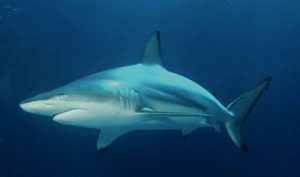
Blacktip Shark
The Blacktip Shark (Carcharhinus limbatus) is a species of requiem shark known for its distinctive appearance and behavior. Here are some interesting facts about Blacktip Sharks:
Appearance: Blacktip Sharks have a slender, streamlined body with a pointed snout and large, black-tipped fins, including the first dorsal fin, pectoral fins, and lower caudal fin lobe. The rest of their body is typically gray or bronze in color.
Size: Blacktip Sharks are moderate-sized sharks, with adults typically measuring between 5 and 7 feet (1.5 to 2.1 meters) in length. The females tend to be larger than males. The maximum reported size for this species is around 8.5 feet (2.6 meters).
Distribution: They are found in tropical and subtropical waters around the world. Blacktip Sharks are commonly encountered in coastal areas of the Atlantic Ocean, the Indo-Pacific region, and the Indian Ocean. They inhabit both inshore and offshore waters.
Habitat: Blacktip Sharks are primarily coastal species, often found in shallow waters close to shore. They prefer habitats such as coral reefs, mangrove forests, estuaries, and sandy or rocky coastal areas. They are known to make seasonal migrations to certain locations.
Diet: Blacktip Sharks are opportunistic predators and feed on a variety of prey. Their diet primarily consists of small bony fish, such as mullet, sardines, and herrings. They also eat cephalopods, crustaceans, and occasionally, smaller sharks.
Behavior: These sharks are known for their energetic and acrobatic displays. They are often observed leaping out of the water, which is thought to be a hunting technique or a form of communication. They are also known to form tight schools, especially during feeding frenzies.
Reproduction: Blacktip Sharks are viviparous, meaning they give birth to live young. The females have a biennial reproductive cycle, and the gestation period lasts around 10 to 12 months. They typically give birth to 4 to 7 pups, with larger females giving birth to more pups.
Conservation Status: The conservation status of Blacktip Sharks varies depending on the region. In some areas, they are considered of least concern, while in others, they may face localized threats due to overfishing and habitat degradation. However, they are not currently considered a globally endangered species.
Human Interaction: Blacktip Sharks are generally shy and non-aggressive towards humans. They are commonly encountered in coastal waters, and while they may approach swimmers or surfers out of curiosity, they do not pose a significant threat. However, caution should always be exercised when encountering any wild shark species.
Ecological Role: As apex predators, Blacktip Sharks play an important role in maintaining the balance of marine ecosystems. They help control the populations of their prey species, contributing to the overall health and diversity of coastal habitats.